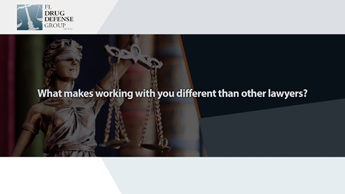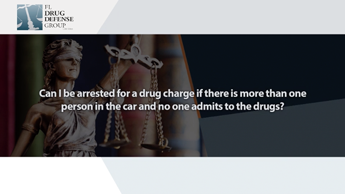The Sixth Amendment And Your Drug Case

In some drug cases, your best hope is to try to enter a pretrial diversion program, which will result in the court dropping the charges against you after you successfully complete the program. Pretrial diversion for drug cases, sometimes known as drug court, is only an option if your charges are for a misdemeanor drug offense such as paraphernalia or misdemeanor drug possession and if you do not have any prior convictions on your record. If you already have a criminal record, or if you are being charged with a felony, then you cannot avoid jail or prison simply by persuading the court that you have learned from your mistakes. Instead, you must show that there is reasonable doubt about whether you did what the state is accusing you of doing, or else you must persuade the court that the state was only able to obtain evidence against you by violating your legal rights. You might be able to get your charges dropped before you get to trial, but you should go into the mindset of preparing to present your case before a jury. In this and other aspects of your criminal case, you can and should have a Florida drug offenses attorney represent you.
What Rights Does the Sixth Amendment Guarantee?
The Sixth Amendment to the United States Constitution indicates that defendants in criminal cases have the following rights:
- A speedy and public trial – The defendant has the right to plead not guilty and go to trial; the state cannot coerce the defendant into pleading guilty. The state should not delay your trial unnecessarily. Unless you request a private trial, your trial will be open to the public.
- An impartial jury – Your lawyer and the prosecutor have the right to interview prospective jurors and to exclude them if they have biases that could influence their votes on your case. You cannot exclude a juror on the basis of the juror’s race or sex.
- Notification of charges – The judge must read you a statement of the crimes of which you are being accused. This way, you can prepare relevant defenses.
- Summoning and cross-examining witnesses – Defendants may summon witnesses to their trials if they believe that the testimony of these witnesses will indicate the defendant’s innocence or cast doubt on the defendant’s guilt. They may also ask questions to witnesses summoned by the prosecution; this is known as cross-examination.
- Representation by a lawyer – Defendants in criminal cases have the right to representation by a professional attorney. Case law has interpreted this clause to mean that the court must appoint a public defender to represent defendants who cannot afford to pay for legal representation. If a defendant prefers to represent himself or herself without a lawyer, the defendant may ask the court for permission to do this.
Contact FL Drug Defense Group About Felony Drug Cases
A Central Florida criminal defense lawyer can help you exercise your legal rights in criminal court. Contact FL Drug Defense Group in Orlando, Florida to discuss your case.







